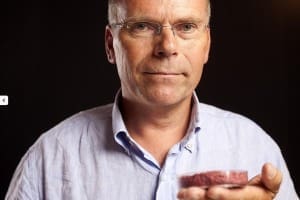SOME of the world’s largest meat processing companies say recent decisions to pour funds into small start-ups developing lab-grown meat, or plant-based alternatives to conventionally farmed meat, is a response to growing consumer demand for sustainably-produced food.
In August US-based meat giant Cargill was one of several investors, including Microsoft founder Bill Gates and Virgin Group founder Richard Branson, which helped lab-grown meat company Memphis Meats to raise $17 million.
Memphis Meats described the successful fund-raising round as “a historic milestone in bringing real meat – without the animal – to the table.”
Cargill’s decision to invest in the unconventional meat producing business, followed a similar investment by US beef, pork and poultry giant, Tyson Foods, which in late 2016 acquired a five percent stake in plant-based meat company Beyond Meat.
Memphis Meats uses a process of growing meat in tanks by feeding oxygen, sugar, and other nutrients to living animal cells.
The California-based company says it is yet to commercialize a product but has already produced beef, chicken, and duck from animal cells.
The company has reportedly reduced the cost of producing a pound of meat so far from $18,000 to $2400, according to reports in Meatingplace and The Wall Street Journal, and says it will use the latest $17m it has raised to accelerate product development and further reduce production costs.
Why invest in businesses seemingly determined to destroy conventional meat production?
So, why would major meat companies want to invest in businesses that seem determined to destroy the conventional meat farming and processing sector upon which their own businesses are based?
That question was recently put to the Tyson Foods CEO Tom Hayes by a Fortune magazine journalist in a web-broadcast video interview.
The Tyson CEO’s response reflected a bigger picture view that Tyson is not just in the meat business but rather the protein business – whether it be animal or plant-based protein – and is very focused on continuing to satisfy changing consumer preferences.
“I would say they do not want to totally destroy us,” Mr Hayes said with a chuckle when asked why his company was investing in a start-up some would view as a direct competitor.
He further explained:
“We believe that protein is going to continue to be in demand. We don’t think of just animal protein, 96pc of consumers in US eat animal protein, but all kinds of protein. So it could be vegetable based, it could be any sort of emerging protein… We’re focused on the consumer and what they want. We have set up a team that focuses on either new technologies with new food types like Beyond meat or it could be sustainability technologies, things that get food waste out of the system. So that has been a big focus for us and we are looking for other investments that will bring us up the curve in terms of sustainable food production at scale.”
Asked how big he thought the alternative meat production business could be, Mr Hayes said it was small today, and animal-based meat was still the most-efficient way to deliver protein.
However, plant based meats were growing now, and a lot of good work was being done in that space.
This was not something Tyson was “trying to propel”, he said, as much as “being behind it for all the right reasons which is satisfying consumers”.
‘Our goal is to provide a complete basket of goods to our customers’
Cargill, in a statement announcing its investment (the amount of which was undisclosed) in Memphis Meats, took a similar line, explaining that its investment reflects a commitment to growing its protein portfolio and “offering protein choice to its customers and consumers”:
“Our goal is to provide a complete basket of goods to our customers. We will do this by growing our traditional protein business, entering into new proteins and investing in innovative alternatives” Cargill Protein group leader Brian Sikes said.
“Our strategic alliance with Memphis Meats is an exciting way for Cargill to explore the potential in growing the cultured meats segment of the protein market. As a leading and trusted source for wholesome, sustainable and responsibly produced protein, this investment fits nicely with our customer-first approach to grow our portfolio.”
Cargill emphasised that it remained fully committed to growing its traditional animal protein business, reinforced by recent investments of nearly $600 million in convention protein operations in North America alone. These investments underscored Cargill’s “overarching commitment to animal protein”, the company statement said.
“At Cargill, we recognize that meat is a core part of consumer diets and central to many cultures and traditions,” Mr Sikes said. “We believe consumers will continue to choose meat as a protein source, and that is why we are focused on bringing it to their table as sustainably and cost-effectively as we can. Our traditional proteins, as well as new innovations like cultured meats, are both necessary to meet that demand.”
Cargill executive vice president Todd Hall said the company had chosen to invest in Memphis Meats because “its proven technology and potential to commercialise set it apart in the cultured meat protein space”.
“Memphis Meats shares Cargill’s mission to strive to provide sustainable protein options, as they provide sustainable cultured meats (beef, chicken and duck products), produced from animal cells.”
Beyond Meat: ‘we both intend to serve the changing consumer’
The startups themselves also see value in investment from traditional meat companies. Beyond Meat CEO Ethan Brown wrote in a recent blog that he “doesn’t expect to change Tyson, and nor does Tyson expect to change me”:
“Instead, we both intend to serve the changing consumer. On my own beliefs, I want to be clear. I believe that plant-based meats have human health (World Health Organization) and climate benefits (Goodland & Anhang) benefits…. Do I think Tyson and its executives are the enemy because they have a radically different view of our relationship to animals? I don’t. I realise that this may disappoint many people. In fact, I’ve found the Tyson executives with whom I’ve interacted to be principled and constructive people. It is true, their beliefs don’t comport with mine on animals. Yet neither do those of my broader family, the vast majority of my friends, colleagues, neighbors, and many others I greatly respect, all of whom eat animal-based meat. The good news is that Tyson and I can-and do—agree on many other things including: the need for sustainable protein for a growing global population; that innovation can fuel growth and profit; and that business best serves the consumer by offering choice.”
“Clean meat”
When the first lab-grown beef burger was introduced to the world four years ago some headlines branded the petri-dish creation “Frankenbeef”.
However, in a sign that the lab-grown meat movement is gaining an edge in the public relations battle, a new term is now appearing in media articles about artificially-grown meat: “clean meat”, which implies by extension that meat from livestock grazed naturally on farms is ‘dirty’.
Many news articles reporting on the rise of companies such as Beyond Meat and Memphis Meat accept without apparent challenge the view that conventional livestock production is bad for the planet, animals, and human health, despite the ready availability of many sources of information challenging these claims.
One source still often-cited to underpin statements that livestock farming is bad for the planet is the 11-year-old FAO Livestock’s Long Shadow report, which produced a widely-reported conclusion that farmed livestock production is responsible for more greenhouse gas emissions than all the world’s cars, planes, trucks, ships, and trains combined.
This is despite the credibility of the 2006 report having come under serious challenge from other scientists who demonstrated that to reach that conclusion, the report’s authors unfairly attributed all direct and indirect greenhouse-gas emissions associated with meat production to farmed livestock, including fertiliser production, land clearance, methane emissions and vehicle use on farms, while their transport figure only included the burning of fossil fuels.
Whether the names ”Frankenbeef’ or ‘Clean Meat’ stick, this trend is gaining momentum, with Memphis Meats indicating after its big fund-raising round that it hopes to have lab-grown meat commercially available by 2020.
RELATED ARTICLES:
- Plant-based burgers could take a big bite from beef, expert warns
- Without transparency, cattle will lose the battle: Dr Mark Post
- Lab grown meat pioneer meets Territory cattle producers


